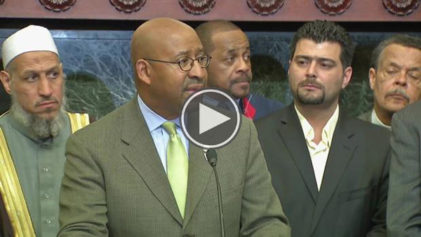During the eight-hour opening session of the President’s Task Force on 21st Century Policing on Tuesday, it became clear why America will have a difficult time getting any reforms in the way police officers conduct themselves in Black communities across the country: Because police leaders don’t believe there’s anything wrong with the way they conduct themselves, believing it’s others who need to change.
The police leaders who spoke to the panel blamed the problems on budget cuts, political correctness and the unintended consequences of laws passed to make law enforcement more effective, according to an account on Buzzfeed. As for charges of racism in police forces, leaders of the Fraternal Order of Police and International Association of Chiefs of Police didn’t want to hear any of that.
Chuck Canterbury, FOP president, said police should face the same scrutiny as everyone else when it comes to fixing community relations.
“We all have the same responsibility towards society. I don’t think a police officer should be held to any kind of a higher standard,” he said in response to questions from task force members. “But we should take the lead and we should work with the communities to help build that trust.”
Canterbury said there’s a “subculture” in the country that “celebrates…resorting to violence and disrespect to police.” He implicated the media, saying it has given a “shoulder shrug” to violence like the riots in Ferguson. He said police are “wary” of some interactions in the wake of the Brooklyn shooting of two police officers, which is why he’s pushing for violence against police to be included in hate crimes statutes.
“One of the worst things in a police department is you don’t ever want to be accused of arresting somebody because of their race, which is an accusation that occurs a lot,” he said.
Richard Beary, president of the IACP, told the panel that “current smear campaigns aimed at law enforcement” had made policing dangerous in the current environment, comparing their treatment to that of “Vietnam vets coming home in the 1970s.”
Activists on the panel like Connie Rice, a task-force member and civil rights attorney from Los Angeles who helped lead LAPD community relations efforts in 2003, didn’t seem to appreciate the tone and aggressive stance of the officers.
“Three of you sounded extremely combative,” she said.
During the eight hours, the panel also heard from academics, civil liberties advocates, and protest leaders who took the police to task for their training, tactics and even the language they use when dealing with suspects. Samuel Walker, a professor emeritus from the University of Nebraska, said bad language leads to a culture of invincibility among cops and anger among citizens who view the police as disrespectful.
Andrew Peralta, a police lieutenant with the Las Vegas police department who also serves as president of the National Latino Peace Officers Association, differed from the other police officials and agreed with the academics and activists calling for new training regimens and community outreach programs to bring police and communities together.
Both police officials and activists agreed on the need for body cameras. Activists called for improvements in the collection of data, which led Roberto Villasenor, chief of police in Tucson, Arizona, and a task force member, to say he was “floored” by holes in police use of force data.
The White House policing panel, co-chaired by former Obama Department Of Justice Office Of Justice Programs director Laurie Robinson and Philadelphia Police Commissioner Charles Ramsey, has until March 2 to listen to the public in four more hearings and then present to Obama a series of viable, tangible recommendations for improving police-community relation.
After his testimony, Philadelphia Mayor Michael Nutter told Buzzfeed that tensions among rank-and-file officers and activists are high, but he said there are some national solutions to be found.
“It’s clearly possible to recommend a change. Change is not going to happen in 90 days,” Nutter said. “I think the president was smart, given the situation in the country right now, to not have a six-month, a nine-month a year-long process. Because that’s just more frustration. Look, we know what a lot of these issues are all about. This is nowhere near rocket science. This is not even science. It’s just common sense. So we know what the [issues] are. Put it together, get it out there, let the public know that we’re really serious about it.”
